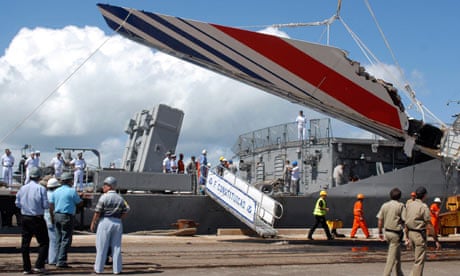Pieces of wreckage from an Air France plane that crashed in the Atlantic in 2009 with 228 people on board have been recovered by underwater teams, according to French investigators.
A fourth attempt began last month to locate remains of the aircraft, and particularly its flight recorders, in the hope of determining the cause of the still unexplained disaster.
The wreckage was recovered at the weekend by a salvage vessel equipped with unmanned submarines, the French air accident investigation agency, the BEA, said on Sunday night. The agency said the pieces were identified as parts of flight 447, which crashed on 1 June 2009 en route from Rio de Janeiro to Paris.
In what was the worst loss of life involving an Air France plane in the firm's 75-year history, those who died included more than 30 nationalities. Search operations that took place in the wake of the crash led to the recovery of 50 bodies as well as hundreds of pieces of the aircraft, including its torn-off tail, but the last search ended in May 2010 after it had failed to find the plane's voice and data recorders.
The latest search, which is being carried out using a deep-sea vessel called Alucia and is being financed by the plane's manufacturers, Air France and Airbus, has been designed to cover an area of approximately 3,900 sq miles.
Robotic equipment has been used to forage in depths of up to 4,000 metres in an area of the ocean floor between Africa and Brazil. Finding the black boxes is seen as essential to help crash experts and relatives understand why flight 447 plunged into a remote part of the Atlantic during an equatorial storm.
"This is very good news because it brings with it the hope that at last we will get some information on what caused this accident, which to this day remains unexplained," Air France-KLM's chief executive Pierre-Henri Gourgeon said.
Speculation about the cause of the crash has focused on the possible icing-up of the aircraft's speed sensors, which appeared to give inconsistent readings seconds before the plane vanished. But an accident report said it was impossible to establish a clear cause without further data held in the missing recorders.
"We do hope that the discovery will lead to the retrieval and reading of the two recorders because this data is essential for the understanding of this accident," said a spokesman for Airbus.
A passenger jet carries two recorders, one for cockpit voices and another to log data from the aircraft's systems.
Air France and Airbus were both placed under formal investigation over the crash last month as part of a French criminal investigation into the causes of the crash. Groups representing victims' families have criticised the way previous searches were carried out.
